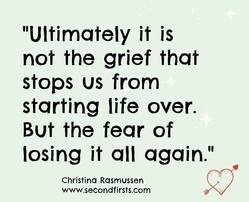
The other day I met a woman a bit older than me. What began as a question about how to start up a leaf blower, soon turned into a full blossomed conversation about how worried she was about her daughter, who had been staying with her for quite some time.
Mary (mother) was worried that Jeanne (daughter) was perpetually sad and seemed to lack energy. With a little gentle probing, she told me that Jeanne's partner had died last year of cancer. Mary couldn't understand why Jeanne wasn't simply 'getting over it'. (I must admit that this is one of my pet peeves when it comes to grief, that we are expected to get over it, like its a stubbed toe or a broken glass) Mary said she had 'gotten over' her divorce when her husband left her for a younger and prettier model. Given that she laboured over that topic for at least five minutes, with lots of huffing and puffing, as well as arm movements, methinks she hasn't really... ;-)
I told her there was no comparison. Besides the fact that grief of any kind is a unique and individual experience, Mary could still 'see' her ex husband. She could have a sense of closure. She could finalise any issues they might have had in their marriage, because he was still alive.
Mary changed tack then and told me that Jeanne and her partner had only been together two years and therefore it should be easy for her to 'get on with her life'. I asked her if she knew the depth of their love and commitment; if she knew how perfect their relationship might have been; if she had any idea of the plans and dreams they had had together. I also tod her that time is irrelevant. We don't need to know someone a lifetime to miss them or grieve for them. We can meet someone for the first time and the impact they made in our life can still mean we grieve. We cannot compare grief journeys, because we are all different. We all view the world differently and we all see it from our own perspective.
As we chatted, Mary was almost dismissive of her daughter's grief, and I couldn't help but mention that her daughter had lost a piece of herself when her partner died. A piece she will never get back or be a part of ever again. Jeanne will have to rediscover who she is and that will take time.
I suggested Jeanne come and talk to me, not as a counsellor or a healer, but as someone who understands, who has been to hell and is still on their way back. Mary looked at me, and in a brief second, I saw fear in her eyes. It was then I knew that not only would Jeanne never visit me, but she wouldn't even get the message. Mary needed Jeanne to be just as she was, because Mary was lonely and felt that she had no real purpose in life. Looking after Jeanne gave her that reason or purpose, and if she got better or began to 'live again', Jeanne might leave Mary with her own ghosts of the past.
Its sad when you see a pattern like this, when dependence or grief is trivialised, and yet, also encouraged to suit the needs of the other person. Mary probably isn't even aware she is doing this, just as Jeanne possibly doesn't realise she is letting it happen. Grief affects us all in many ways. We may think we have it under control or a handle on it, but it has many faces we don't often recognise.
Big hugs
Cherie ♥
 RSS Feed
RSS Feed